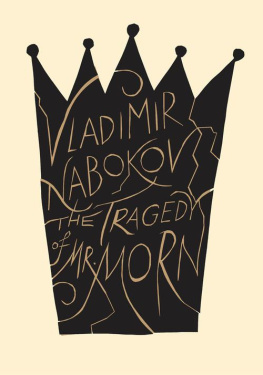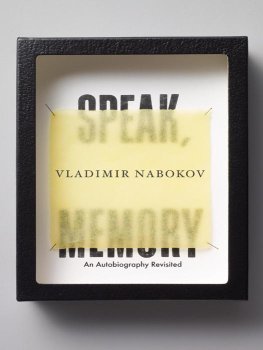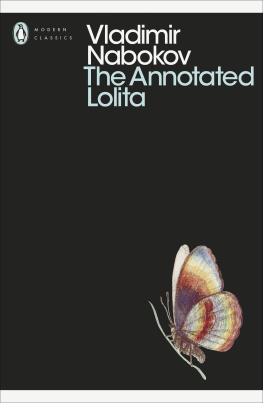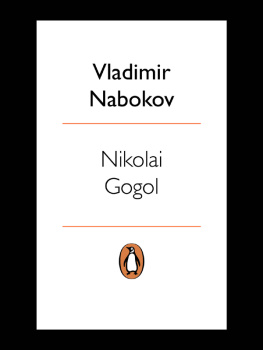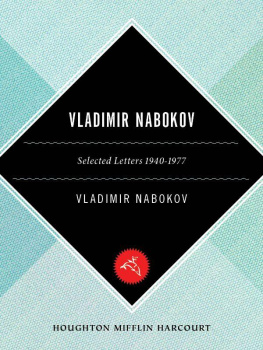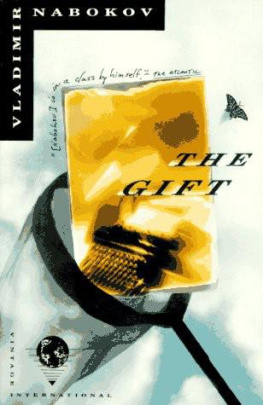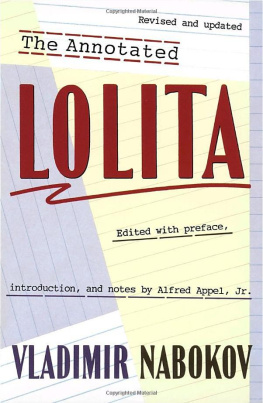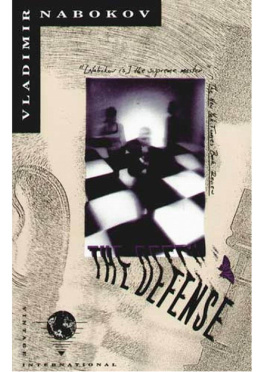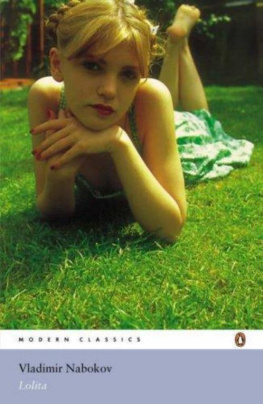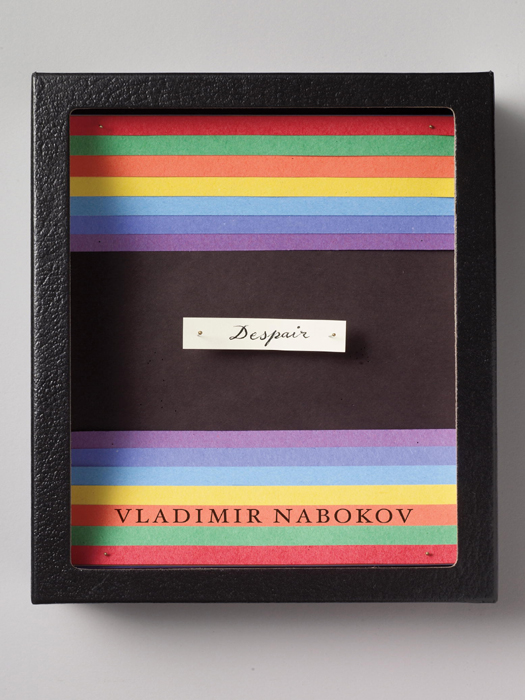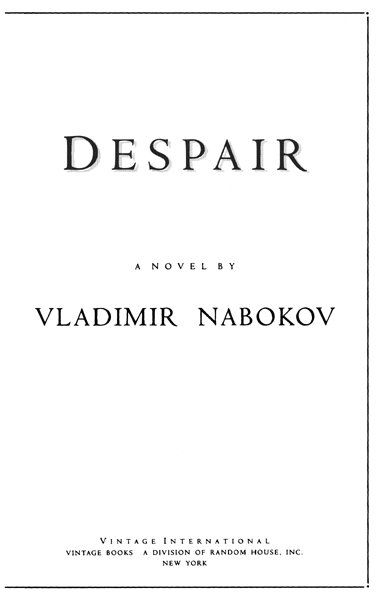BOOKS BY Vladimir Nabokov
NOVELS
Mary
King, Queen, Knave
The Defense
The Eye
Glory
Laughter in the Dark
Despair
Invitation to a Beheading
The Gift
The Real Life of Sebastian Knight
Bend Sinister
Lolita
Pnin
Pale Fire
Ada or Ardor: A Family Chronicle
Transparent Things
Look at the Harlequins!
SHORT FICTION
Nabokovs Dozen
A Russian Beauty and Other Stories
Tyrants Destroyed and Other Stories
Details of a Sunset and Other Stories
The Enchanter
DRAMA
The Waltz Invention
Lolita: A Screenplay
The Man from the USSR and Other Plays
AUTOBIOGRAPHY AND INTERVIEWS
Speak, Memory: An Autobiography Revisited
Strong Opinions
BIOGRAPHY AND CRITICISM
Nikolai Gogol
Lectures on Literature
Lectures on Russian Literature
Lectures on Don Quixote
TRANSLATIONS
Three Russian Poets: Translations of Pushkin,
Lermontov, and Tiutchev
A Hero of Our Time (Mikhail Lermontov)
The Song of Igors Campaign (Anon.)
Eugene Onegin (Alexander Pushkin)
LETTERS
Dear Bunny, Dear Volodya:
The Nabokov-Wilson Letters, 19401977
Vladimir Nabokov: Selected Letters, 19401977
MISCELLANEOUS
Poems and Problems
The Annotated Lolita

First Vintage International Edition, May 1989
Copyright 1965, 1966 by Vladimir Nabokov
All rights reserved under International and Pan-American Copyright Conventions. Published in the United States by Random House, Inc., New York. Originally published, in hardcover, by the Putnam Publishing Group, Inc., New York, in 1966. This edition published by arrangement with the Estate of Vladimir Nabokov.
A somewhat briefer version of this novel originally appeared in Playboy.
Library of Congress Cataloging-in-Publication Data
Nabokov, Vladimir Vladimirovich, 18991977.
Despair: a novel.
(Vintage international)
Translation of: Otchaianie.
Originally published: New York: G.P. Putnams Sons, 1966.
I. Title.
PG3476.N3083 1989 813.54 88-40533
eISBN: 978-0-307-78766-8
Cover art by Jason Fulford and Tamara Shopsin
Cover photograph by Alison Gootee
v3.1
To Vra
Contents
Foreword
The Russian text of Despair (Otchayaniea far more sonorous howl) was written in 1932, in Berlin. The migr review Sovremennye Zapiski, in Paris, serialized it in the course of 1934, and the migr publishing house Petropolis, in Berlin, published the book in 1936. As has happened in the case of all my other works, Otchayanie (despite Hermanns conjecture) is banned in the prototypical police state.
At the end of 1936, while I was still living in Berlinwhere another beastliness had started to megaphoneI translated Otchayanie for a London publisher. Although I had been scribbling in English all my literary life in the margin, so to say, of my Russian writings, this was my first serious attempt (not counting a wretched poem in a Cambridge University review, circa 1920) to use English for what may be loosely termed an artistic purpose. The result seemed to me stylistically clumsy, so I asked a rather grumpy Englishman, whose services I obtained through an agency in Berlin, to read the stuff; he found a few solecisms in the first chapter, but then refused to continue, saying he disapproved of the book; I suspect he wondered if it might not have been a true confession.
In 1937 John Long Limited, of London, brought out Despair in a convenient edition with a catalogue raisonn of their publications at the back. Despite that bonus, the book sold badly, and a few years later a German bomb destroyed the entire stock. The only copy extant is, as far as I know, the one I ownbut two or three may still be lurking amidst abandoned reading matter on the dark shelves of seaside boarding houses from Bournemouth to Tweedmouth.
For the present edition I have done more than revamp my thirty-year-old translation: I have revised Otchayanie itself. Lucky students who may be able to compare the three texts will also note the addition of an important passage which had been stupidly omitted in more timid times. Is this fair, is this wise from a scholars point of view? I can readily imagine what Pushkin might have said to his trembling paraphrasts; but I also know how pleased and excited I would have been in 1935 had I been able to foreread this 1965 version. The ecstatic love of a young writer for the old writer he will be some day is ambition in its most laudable form. This love is not reciprocated by the older man in his larger library, for even if he does recall with regret a naked palate and a rheumless eye, he has nothing but an impatient shrug for the bungling apprentice of his youth.
Despair, in kinship with the rest of my books, has no social comment to make, no message to bring in its teeth. It does not uplift the spiritual organ of man, nor does it show humanity the right exit. It contains far fewer ideas than do those rich vulgar novels that are acclaimed so hysterically in the short echo-walk between the ballyhoo and the hoot. The attractively shaped object or Wiener-schnitzel dream that the eager Freudian may think he distinguishes in the remoteness of my wastes will turn out to be on closer inspection a derisive mirage organized by my agents. Let me add, just in case, that experts on literary schools should wisely refrain this time from casually dragging in the influence of German Impressionists: I do not know German and have never read the Impressionistswhoever they are. On the other hand, I do know French and shall be interested to see if anyone calls my Hermann the father of existentialism.
The book has less White-Russian appeal than have my other migr novels; hence it will be less puzzling and irritating to those readers who have been brought up on the leftist propaganda of the thirties. Plain readers, on the other hand, will welcome its plain structure and pleasing plotwhich, however, is not quite as familiar as the writer of the rude letter in Chapter Eleven assumes it to be.
There are many entertaining conversations throughout the book, and the final scene with Felix in the wintry woods is of course great fun.
I am unable to foresee and to fend inevitable attempts to find in the alembics of Despair something of the rhetorical venom that I injected into the narrators tone in a much later novel. Hermann and Humbert are alike only in the sense that two dragons painted by the same artist at different periods of his life resemble each other. Both are neurotic scoundrels, yet there is a green lane in Paradise where Humbert is permitted to wander at dusk once a year; but Hell shall never parole Hermann.
The line and fragments of lines Hermann mutters in Chapter Four come from Pushkins short poem addressed to his wife in the eighteen-thirties. I give it here in full, in my own translation, with the retention of measure and rhyme, a course that is seldom advisablenay, admissibleexcept at a very special conjunction of stars in the firmament of the poem, as obtains here.


